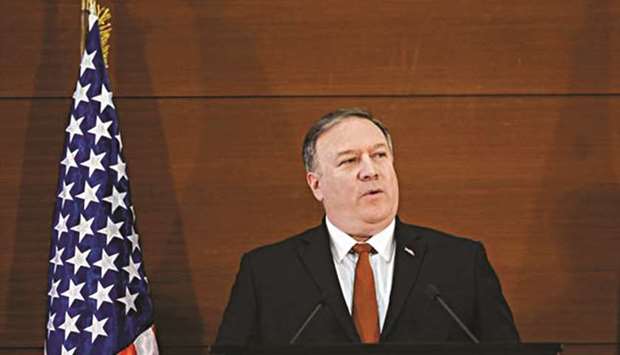Earlier this month, academics at the American University in Cairo declared no confidence in the institution’s president, following his decision to grant US Secretary of State Mike Pompeo an uncontested platform for a partisan foreign-policy speech last month. Pompeo used the occasion to decry former president Barack Obama’s own pronouncements from the same stage a decade earlier, and to issue an implicit endorsement of the Middle East’s reigning autocrats.
Pompeo’s primary line of attack against Obama’s famous Cairo speech, “A New Beginning,” is that it included a public admission of the United States’ past missteps in the region. Unlike the Trump administration, Obama and his advisers believed that there is much to be gained by acknowledging difficult political truths, even when doing so points to a radical change in course.
Accordingly, when Obama delivered his June 2009 speech, he took the bold step of admitting mutual misunderstandings between the West and the Arab and Muslim worlds. He acknowledged that Western colonialism “had denied rights and opportunities to many Muslims,” and that “modernity and globalisation” had “led many Muslims to view the West as hostile to the traditions of Islam.”
Touching on America’s response to the attacks of September 11, 2001, Obama conceded that “fear and anger … in some cases … led us to act contrary to our traditions and our ideals.” But, most important, he argued that, “we must say openly to each other the things we hold in our hearts and that too often are said only behind closed doors.” Only then could mutual trust, peace, democracy, and equality be achieved.
Pompeo’s vulgar re-enactment of Obama’s appearance in Cairo reflected the foundational importance of the 2009 address. As it happens, Obama’s address was followed 18 months later by the Arab Spring, which, despite its overarching failure, put more countries in the region – particularly Tunisia – on varying paths to democracy. Obama also issued an overture to Iran, setting the stage for unprecedented negotiations and an eventual agreement that would forestall a regional nuclear arms race.
Implicit in Pompeo’s repudiation of Obama is the idea that American strength depends on never admitting any wrongdoing. Like many of the Trump administration’s policy choices, Pompeo’s act of political theatre seemed to have been geared toward reversing or erasing Obama’s legacy. Whereas Obama opened his speech in Cairo with the Arabic greeting “Assalaamu alaykum,” Pompeo began his with references to the Bible and to his own commitment to evangelical Christianity.
Categorically rejecting Obama’s call for a “new beginning,” Pompeo touted America as “a force for good” in the region. “The age of self-inflicted American shame is over,” he announced, “and so are the policies that produced so much needless suffering. Now comes the real new beginning.”
From its opening days, the Trump administration has expressed contempt for the idea that public confessions of American missteps can do anything but weaken the US. Hence, in his May 2018 commencement address at the US Naval Academy, President Donald Trump announced that, “We are not going to apologise for America. We are going to stand up for America. … Because we know that a nation must have pride in its history to have confidence in its future.”
In fact, Trump’s rejection of historical introspection and atonement is at odds with a longstanding American tradition of deriving strength from conciliatory leadership on the world stage. Since America’s founding, its best foreign-policy moments have come when its leaders act pragmatically, demonstrating a capacity for self-reflection.
For example, after the Revolutionary War, America’s first president, George Washington, pushed for reconciliation and a favourable peace settlement (a “new beginning”) with Great Britain. Rather than dwell on colonial grievances and past British transgressions, his primary concern was to ensure political stability and sound economic relations for both countries well into the future.
Similarly, as the American Civil War was nearing its end, President Abraham Lincoln focused not on punishing the Confederacy, but on formulating an inclusive policy to reunite the country in a “new birth of freedom.” More recently, president George HW Bush apologised and issued reparations, on behalf of the country, to Japanese-Americans who had been interned during World War II on the basis of their ethnicity. And that gesture was eventually followed by Obama’s much-heralded speech in Hiroshima, where he reflected on America’s use of atomic bombs against Japanese civilians (though he did not issue a formal apology).
Finally, since the 1990s, the US has been reckoning with the legacy of the Cold War. While President Bill Clinton apologised for the US’s “dirty war” policies in Central America during the second half of the 20th century, Obama acknowledged similar US actions in Cuba, Peru, and Argentina. These statements had uncertain political payoffs, but they demonstrated real political leadership, and presented America as an honest broker, despite its many imperfections.
As the recent faculty revolt at the American University in Cairo showed, the Trump administration risks finding itself on the wrong side of history. By repudiating past acts of American atonement, Pompeo was no doubt hoping to signal a break from Obama-era US foreign policy. But he was also abandoning a tradition of American global leadership that has long served as a source of national strength. As is typical with the Trump administration, its partisan chest-thumping backfired. Though Pompeo stood unchallenged in Cairo, the position he represents has become an increasingly lonely one on the world stage. – Project Syndicate
* Ruti Teitel is the Ernst C Stiefel Professor of Comparative Law at New York Law School, a lifetime member of the Council on Foreign Relations, and the author of Globalizing Transitional Justice. Her forthcoming book from Oxford University Press is Righting Our Global Wrongs: The President and Justice for American Empire.

File photo of US Secretary of State Mike Pompeo speaking to students at the American University in Cairo, Egypt, on January 10 this year.
